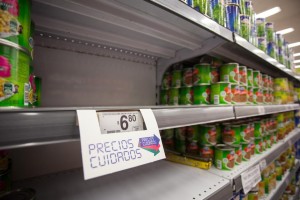EspañolDisbelief. Incomprehension. A loss for words. These are the sorts of reactions one can expect from a foreigner when Argentineans recount what occurs in their country.
Over the last decade, Argentina has been suffering through increases in inflation, declining economic activity, and poor employment prospect, even according to the manipulated statistics used by the government. The inflation rate in 2013 was over 28 percent, according to the average estimate by private consultants, yet reached 40 percent at times throughout the year. This is a result of a deliberate government policy to keep this uncontrollable public-spending party going.
The solution proposed by the country’s economic team was to impose price controls on 194 products. They initially called this campaign “Frozen Prices,” although now they euphemistically refer to it as “Careful Prices.” This economic policy was taken to the extreme on Wednesday, when the first two supermarkets were shut down for “non-compliance” with the price agreement and “commercial disloyalty.”
Yes, and closed doors will ward off shortages. As Carlos Maslatón, a financial lawyer and radio journalist, has observed, “the enforcement of sanctions, such as the closing of supermarkets over alleged violations of price controls established by the government, has adverse effects on this sector and the economy as a whole. These are policies that have not been seen in Argentina since the mid-70s.”
Iván Cachanosky, analyst for the Liberty and Progress Foundation (L&P), believes it is physically impossible to police every establishment in all of Argentina. “They are outnumbered, and basically need an army to do the job. I see it as totally unworkable. The sad thing is, all the time being wasted by those people supposedly ‘working.'”
We have seen price controls implemented throughout history over the last 4,000 years, and not once has it achieved the desired effect. In a society lacking the stimulus to produce, where creativity for business development is stifled, without incentive or profitability, only pseudo-businessmen survive through subsidies and agreements with their friends in government.

“Over 2,000 years ago, the Romans cut the heads off those who raised prices. But the government continued to devalue the currency (using less metal in each coin) and inevitably prices continued to rise,” explains Agustín Etchebarne, L&P director. (If you understand Spanish, I suggest careful viewing of this video prepared by the L&P Foundation on the causes of inflation.)
With regard to closure of commercial businesses, Etchebarne explains that “if you reduce the price of a product, there is less incentive to produce it. Therefore, there are fewer people willing to produce it and this reduces overall production. At the same time, there are more people willing to consume, and this increases demand. So, over time, prices will actually rise much faster than in those sectors where prices were not being controlled, no matter how many heads roll.”
Selfish, Greedy Businessmen
Are Argentinean businesses greedier than those in other parts of the world? I don’t believe so.
The government always speaks of ending speculation with the excessive profits of selfish businessmen. Could it be that prices go up as a result of policies that punish investment, themselves a consequence of constant demagoguery?
Henry Hazlitt, a US economist best known for his book Economics in One Lesson, writes that “Free prices and free profits will maximize production and relieve shortages quicker than any other system. Arbitrarily-fixed prices and arbitrarily limited profits can only prolong shortages and reduce production and employment” (p.143).
In Argentina, the government does not want to balance its budget, reduce the tax burden, nor end wasteful public spending. It prefers to print, print, and print. It spends more than its able to collect, and has placed credit in circulation that the public never requested. The highest denomination of currency in Argentina (100 pesos) does not even exceed 10 US dollars.
What to Expect
On the one hand, the government has decided to shut down businesses that sell legitimate products, undermining the power of citizens to decide whether or not certain goods are worth their price or if they’d rather keep the cash. On the other hand, they seem to be taking measures to fight inflation and remove pesos from circulation, absorbing them through Argentina’s Central Bank (BCRA).
According to Etchebarne, “the absorption of pesos by the Central bank will generate the famous [during the hyperinflation years] quasi-fiscal deficit.” That occurs with monetized budget deficits but an otherwise contractionary monetary policy. “This may have a short term effect, and inflation in the second quarter of the year may be much lower than in the first quarter. The second effect will be that the economy will feel the adjustment.”
It appears that what is happening is simply an attempt to patch up a bleeding economy. The government is juggling the narrative and identity of the Kirchner economic model, while trying to disinfect the inflationary wounds through the Central Bank.
However, the necessary healing process caused by a forgone 10 years of possible growth and production is going to hurt — and hurt a lot. The adjustment is already in process, and as with all recoveries, it will take time. This is especially true if the actions taken for its cure are merely superficial and without substance.
 Versión Español
Versión Español












